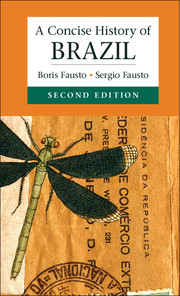Book contents
- Frontmatter
- Dedication
- Contents
- List of Maps
- Preface
- Map
- 1 Colonial Brazil (1500–1822)
- 2 Imperial Brazil (1822–1889)
- 3 The First Republic (1889–1930)
- 4 The Vargas State (1930–1945)
- 5 The Democratic Experiment (1945–1964)
- 6 The Military Government and the Transition to Democracy (1964–1984)
- 7 Modernization under Democracy (1985–2010)*
- Bibliography
- Index
2 - Imperial Brazil (1822–1889)
Published online by Cambridge University Press: 05 August 2014
- Frontmatter
- Dedication
- Contents
- List of Maps
- Preface
- Map
- 1 Colonial Brazil (1500–1822)
- 2 Imperial Brazil (1822–1889)
- 3 The First Republic (1889–1930)
- 4 The Vargas State (1930–1945)
- 5 The Democratic Experiment (1945–1964)
- 6 The Military Government and the Transition to Democracy (1964–1984)
- 7 Modernization under Democracy (1985–2010)*
- Bibliography
- Index
Summary
Consolidating Independence and Building the State
Independence was consolidated in a few years. Portuguese troops resisted in the Cisplatine Province, but they left it in November 1823. At that point, a long war for Uruguayan independence began, but now it was a war against Brazil rather than against Portugal. Another center of confrontation was Bahia, where Brazilians finally defeated the Portuguese.
Internationally, the United States recognized Brazil’s independence in May 1824. It had been informally recognized by Britain, which wanted order maintained in the old Portuguese colony. Thus Britain preserved its commercial advantage in a country which, at that time, was its third largest foreign market. Formal recognition was delayed because the British tried to get Brazil to put an immediate end to its slave trade. Still, directly or indirectly, the British were present during the consolidating phase. They were also intermediaries in Portugal’s recognition of the new nation.
That occurred in August 1825, in a treaty whereby Brazil agreed to pay Portugal 2,000,000 British pounds sterling for the loss of its old colony. It also agreed not to unite with any other Portuguese colony. The need to compensate the Portuguese crown occasioned Brazil’s first foreign loan, which it took out in London. The second clause, which might seem strange, can be explained by the fact that Brazilian interests linked to the slave trade were strongly ensconced at different places along the coast of Africa. When news of Brazil’s separation reached Angola, pamphlets printed in Brazil appeared inviting Benguela to join the “Brazilian cause.” Portugal’s worry was, it seems, not baseless.
- Type
- Chapter
- Information
- A Concise History of Brazil , pp. 75 - 143Publisher: Cambridge University PressPrint publication year: 2014



